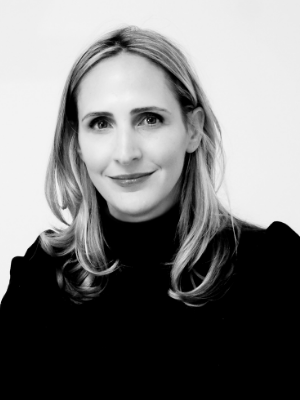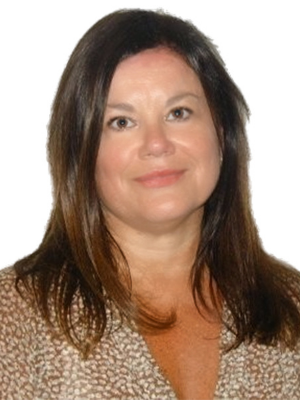 “The combination of expressing your needs and doing fewer things better is what I have learned in recent years,” says Kate Archibald, who shares on advancing in a workplace of women, creating a spherical life and managing up.
“The combination of expressing your needs and doing fewer things better is what I have learned in recent years,” says Kate Archibald, who shares on advancing in a workplace of women, creating a spherical life and managing up.
Growing as a Leader While Surrounded By Women
Having grown up in New York, Archibald idolized the big fashion house vibe. She was magnetized to how creativity and business merged together at Estée Lauder, where she spent 14 years specializing in luxury brands, including Tom Ford Beauty and Bobbi Brown, honing her career towards tech marketing. In November, she moved to Dash Hudson, an all-in-social entertainment insights marketing software platform that works across some of the most influential global brands including Apple, Amazon and Disney.
With three kids (currently, seven years, five years and ten months old) and a husband with a full-time job, maintaining her career through the family journey has been a choice she has committed to, partly because she derives great satisfaction from her work, and also because of the independence mindset she adopted early on.
“My father really impressed upon me the value of being independently successful as a woman and used to impress upon me that I could be a CEO,” she reflects, “He’s been a huge impact in my life, so being independent has always been important for me.”
At Estée Lauder, she was surrounded by a workforce of 85% women, so the vertical track to, and horizontal track across, leadership positions were well-accessible for women who wished to advance, and Archibald navigated across several cross-functional leadership positions.
“I was encouraged and enabled, and there were opportunities,” she says. “You still have to know that nobody is going to hold your hand, and you are the owner of your destiny. But it helps to be in a place where the growth mentality as a woman is appreciated.”
Now at Dash Hudson, Archibald enjoys the mix of professional and personal life supported by the tech-like atmosphere and culture while still leveraging the leadership experiences she gained through her tenure in beauty and luxury.
Creating a Spherical Life and Reserving Family Time
“I am very direct in terms of what we’re trying to accomplish and what we need to do to achieve our goals. I try to get to the root of the problem and reduce the back-and-forth,” Archibald says, accrediting her need for work-family balance for the acute focus. “I also enjoy creating an environment of collaboration by enabling people to see outside of their silos, and to understand how the piece they are contributing is interrelated and contributing to the other teams. I’m a huge proponent of creating a structured collaboration framework and connecting the dots.”
Archibald has recently been inspired by the novel approach her CEO takes to hiring and culture at Dash Hudson: “The mentality is people first. Let’s find the best, smartest, most amazing people and figure out where they can add the most value. The strength of the talent and the true belief that diversity makes us stronger creates an incredible culture. The level of support felt between peers and teams is a real shift for most people when they join the company. Especially in a hybrid environment.”
Within a mostly female environment for over a decade, Archibald has had the benefit of sharing lots of honest conversations with successful women. She has often sought insight on managing professional and family demands, even the basics of keeping a household running. A recommendation she received along the way was to think of your life as a circle or a pie graph that includes everything that is important to you:- family, work, health, friends, spirituality, etc.
“If one part of the pie gets more dominating than you want it to be, you have to consider how to make that part smaller so you can ‘right-size’ your family life or your spiritual life, for example,” she says. “That has really helped me to compartmentalize what I’m doing and how it impacts the other parts of my life.”
As a traditional Jewish family, Archibald and her family observe Shabbat every week, reserving Friday night and Saturday strictly for time with family. Honoring this has been fundamental in helping manage her time, and because that time is a weekly fixed date, it’s also helped her feel more peaceful during the week when she needs to work. Additionally, it ensures that she is aligned with her partner on their collective family goals.
“I think a lot of parents feel guilty if they don’t have dinner every night with their family,” she says. “But for me, every Friday is a guaranteed dinner together with all the family and Saturday is family, all day. No exceptions. It has given me a supportive structure in my life.”
In addition to being influenced by her father’s outlook on independence and her supportive husband, Archibald attests that her mother is the hardest working person she knows. While Archibald went off to first grade, her mother went back to school and obtained her PhD in Neuropsychology. Inspired by her, Archibald wishes to model to her daughter and two sons that a woman can have a career and still be present for her family.
Managing Up and Knowing Your Own Expectations
As she’s grown more senior in her career, Archibald has found herself getting better at reinforcing her own brand of executive presence and managing up: “The transition over your career is toward managing up, and ensuring that you get what you need. I learned this the hard way when faced with health challenges, when I was doing too much and not telling people what I needed. I really have come to see the importance of don’t take on too much and do fewer things better, both of which I pass on to women just starting their career.”
When it comes to mentoring, she also tells everyone, but especially mothers with young children, that if you’re not happy at home, you’re not going to be happy at work.
“If your work is really impacting your home life, take that step back to figure out what and how you can fix it. Push for flexibility, which is becoming more common, or figure out what the issue is,” she says, “But if you’re not satisfied with how much time you have with your family, you’re never going to be happy at work, no matter how much money you’re making.”
Archibald advises women to go back to the sphere and consider the balance across areas and really understand “what does good look like, for you?” which is different for everyone. She says, you have to be able to manage life in a way that works for your expectations for your family and work life ― and honestly, check if your employer is willing to support that for and with you.
Changing Jobs Amidst a Remote Workplace
Having joined Dash Hudson well into the pandemic, and in the middle of her crossover maternity leave, Archibald has yet to meet her new colleagues in person. But in this exceptional context of our times, she has hugely valued a strong and communicative organizational culture, which has supported her onboarding and becoming part of the team.
Together, her family loves skiing in the winter and swimming in the summer in the Hudson Valley, where she loves being outdoors and active in nature. She has a real passion for ice cream and swears her ice cream place in Tivoli, New York is verifiably (just check Food & Wine Magazine) the best in the world.
By Aimee Hansen


